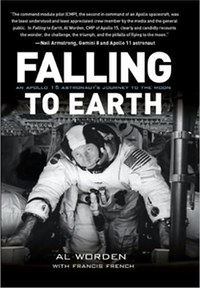Review: Falling to Earthby Jeff Foust
|
| “Going to the moon was wonderful, but in terms of personal achievement it was a rote skill,” he writes. “Personally, running for Congress was a much bigger challenge than going to the moon.” |
Many perceive being a CMP as something of a consolation prize for Apollo-era astronauts: yes, you get to go to the Moon, but you get left behind in orbit while your crewmates walk on the surface. Worden writes that it was a tradeoff: yes, as lunar module pilot you got to walk on the Moon, but that position was more of “system engineer” role since it was the mission commander who was actually flying the spacecraft. The CMP, by comparison, got to fly the spacecraft. “I was keener on the idea of actually flying something,” he writes. “Less glory, but more flying—that was my tradeoff.” (It didn’t hurt, he added, that being a CMP was seen as a faster route to commanding a later mission: Dave Scott, commander of Apollo 15, had been the CMP on Apollo 9.) Worden clearly relished the role on that mission, carrying out experiments while Scott and Jim Irwin were on the surface, and performing the first deep-space EVA on the return trip to retrieve film canisters from cameras mounted in the spacecraft’s service module.
However, it was the aftermath of the mission that would provide Worden with his closest brush to fame—or, rather, infamy. After months of post-mission festivities, including a speech before a joint session of Congress and a visit with President Nixon at the White House, news broke that the Apollo 15 crew had carried hundreds of postal covers that they gave to collectors, who had started selling them. The outcry led to investigations and a congressional hearing, and cost Worden and his crewmates their positions in the astronaut corps. Worden doesn’t shy away from covering this topic in Falling to Earth, readily accepting blame for a lapse in judgment in agreeing to fly the covers. While noting that the collectors didn’t uphold their end of the deal by selling the covers early, and suggesting that Scott, who arranged the deal, didn’t shoulder enough of the blame, he accepts—in sometimes blunt language—he made a bad decision by agreeing to go along with the deal. “I made a decision that f----d up my life completely, utterly, and irreversibly,” he writes.
While ostracized from his astronaut colleagues because of the controversy (he left Houston to take a position at NASA Ames for a few years before retiring from NASA and the Air Force to work in the private sector) he looked past those events over time and eventually came to peace with his decision. His fellow astronauts have done the same: Falling to Earth features a foreword by Dick Gordon and an epilogue by Tom Stafford, who both speak highly of Worden. “Al should not have his efforts degraded by the decades-old, short-lived publicity surrounding some postal covers carried on board,” Stafford writes.
Worden quickly goes through his post-Apollo life, including work in the private sector and a failed run for Congress in 1982. He makes clear that, unlike some of his colleagues, he didn’t feel any letdown after going to the Moon, any sense that his life had peaked on that mission. “Going to the moon was wonderful, but in terms of personal achievement it was a rote skill,” he writes. “Personally, running for Congress was a much bigger challenge than going to the moon.” Worden notes at the end of Falling to Earth that writing the book also provided closure on his career, an opportunity to tell a story he had been unable to for four decades. “I can look back on my moon flight with no lingering sense of unfinished business,” he states. That full story is worth a read, a reminder that all the men who journeyed to the Moon during that incredible era had experiences worth remembering.
